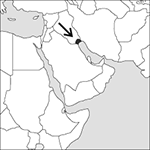
Capital:
Kuwait City
Area:
17,818 sq km (6880 sq miles)
Population:
2,695,316 (2013 est)
Currency:
1 Kuwaiti dinar=1000 fils
Religions:
Sunni Muslim 59.5%; Shiite Muslim 25.5%
Ethnic Groups:
Kuwaiti Arab 45.0%; non-Kuwaiti Arab 35.0%; South Asian 9.0%
Languages:
Arabic (official); English
International Organizations:
UN; Arab League; GCC; OPEC; OAPEC; Non-Aligned Movement; WTO
A small country in the north-west corner of the Gulf, flanked by Iraq and Saudi Arabia.
Physical
Kuwait is mainly low desert, very hot in summer but cool in winter, and extremely arid.
Economy
With an estimated 6% of the world’s petroleum reserves, Kuwait’s economy is based on oil extraction, refining, and petrochemical industries. Oil constitutes around 60% of GDP and 95% of export earnings.
History
Kuwait was founded in the early 18th century by members of the Utub section of the Anaiza tribe, and has been ruled since 1756 by the al-Sabah family. In 1899 the ruler, Muvarak, signed a treaty with Britain which established a de facto British protectorate over Kuwait, although it remained under nominal Ottoman suzerainty until 1914, when the protectorate was formalized. Kuwait became independent in 1961, when an Iraqi claim was warded off with British military assistance. Oil had been discovered in 1938; after World War II, Kuwait became one of the world’s largest oil producers. The country’s defensive pact with Britain lapsed in 1971, after which it tried to pursue a policy of neutrality. Its massive wealth was in part channelled into modernization programmes. But in 1990 Iraq revived the frontier dispute of 1961, and on 2 August 1990 began its seven-month occupation of Kuwait. In the period before liberation in the Gulf War, thousands of Kuwaitis were killed. After the war, reconstruction costs were estimated at up to $100 billion, with serious environmental damage caused by Iraqi sabotage of 732 oil wells. In 1992 the first parliamentary elections in the country’s history were held, in which only 13% of the population was eligible to vote. Even so, many opposition candidates were elected. In 2005 women were given the vote and allowed to stand for public office; four women were elected to Parliament in 2009. The 21st century has seen continued political conflict between the royal family and the increasingly assertive parliamentary opposition. In 2012 a revised electoral law considered favourable to government candidates led to popular protests and an opposition boycott of subsequent elections. However, in elections called in 2016, nearly half the seats were won by opposition candidates, many linked to the Muslim Brotherhood. As a result, the opposition has been able to impede austerity measures proposed by the government.
- groupware server
- grouse
- grouting
- Grover’s algorithm
- growan
- grown junction
- growth
- growth accounting
- growth band
- growth cone
- growth curve
- growth cycles
- growth factor
- growth fault
- growth-fibre analysis
- growth fibres
- growth hormone
- growth line
- growth medium
- growth model
- growth pole
- growth rate
- growth ring
- growth substance
- growth triangle